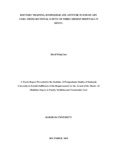DOCTORS’ TRAINING, KNOWLEDGE AND ATTITUDE IN END OF LIFE CARE: CROSS-SECTIONAL SURVEY OF THREE MISSION HOSPITALS IN KENYA
Abstract
There is an increasing number of people in Kenya with life limiting illnesses secondary to HIV/AIDS, cardiovascular diseases and cancer. Patients who suffer from these illnesses require palliative and end of life care. In developed countries such care is often given in a hospice or at home by palliative service professionals. In Kenya, there are limited such resources and opportunities and therefore care frequently ends up being offered by inpatient healthcare professionals. When this occurs, the patients‟ management is normally spear-headed by doctors. Currently there is a paucity of data regarding how prepared the doctors are in offering end of life care. The aims of this study were three-fold: to assess doctors‟ previous training in end of life care, to assess doctors‟ knowledge regarding end of life care, and to assess doctors‟ attitude towards end of life care. A descriptive cross-sectional survey utilizing a questionnaire was administered to doctors working in three mission hospitals in Kenya. Descriptive statistics and independent student t-test for association of knowledge and attitude scores was analysed using SPSS version 25.The response rate was 59.2%. Forty percent of the respondents had not had any end of life care training as part of their undergraduate curriculum. For those who had received training only 26% had received bedside training in addition to didactic lectures. Half of the respondents had pursued further training in end of life care after undergraduate training. End of life care knowledge was positively associated with having received both lectures and bedside teaching (p=0.001) as an undergraduate as well as having undergone further training in end of life care at postgraduate level (p=0.046). Other factors associated with a higher knowledge score on end of life care were: older age (p=0.008), seniority (p=0.000), medical specialty (p=0.029), having trained in a developed country (p=0.000) and having >10 years clinical experience (p=0.004).There was no significant association between the amount of training doctors had received and their attitude to end of life care. However, a positive attitude was associated with having >10 years of clinical experience (p=0.018), seniority (p=0.005), having trained in Kenya versus other developing countries (p=0.035) and having cared for >20 patients in the last six months of clinical practice (p=0.007). In conclusion, forty percent of doctors working in three mission hospitals in Kenya had never received any form of undergraduate training in end of life care. Those clinicians who had received more intensive end of life care training appeared to have a greater knowledge of end of life care management. Clinicians‟ attitude towards end of life care did not associate with the degree of training they had received. However, it was affected by a clinician‟s seniority and exposure to palliative patients. Curriculum reviewers should incorporate end of life care as part of training for all doctors. The training should include both lectures and bedside tutorial. Further research on the practice of end of life care is also recommended.

